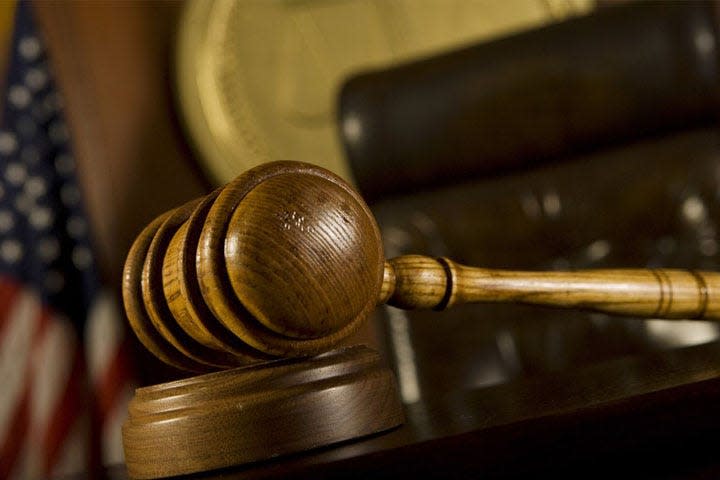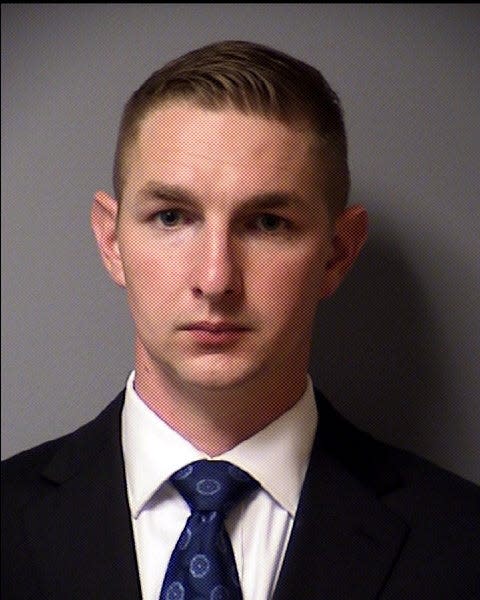Judge rules officer Taylor's statements to internal affairs can't be shared with state

A district judge on Monday denied a motion by prosecutors to be allowed access to statements Austin officer Christopher Taylor made during a Police Department internal affairs investigation about the fatal shooting of Mike Ramos. Only defense lawyers are allowed to access the statements, the judge ruled.
Taylor is charged with murder in the shooting death of Ramos in 2020. Ramos, a Black and Latino man, was shot and killed by Taylor in an apartment complex parking lot on April 24, 2020. Police said Taylor was among a group of officers responding to a 911 call reporting that a person possibly involved in a drug deal had a gun.
More: Murder trial to begin for Austin police officer in 2020 shooting of Mike Ramos
Jury selection for Taylor's trial will start over on Tuesday. Potential members who were picked on Monday were dismissed after the court realized the courtroom doors had been locked and the public was not allowed access to the selection, officials said. The public has a right to attend jury selection, according to Texas law.
"It is essential to our criminal justice system that this case will be treated like any other criminal case," said a statement from the Travis County District Attorney's office on Monday. "We are hopeful that the court’s eventual decision to allow the public to observe the proceedings will put us on that track."
The district attorney's office made the motion to be given Taylor's personnel records involving the internal affairs investigation after Judge Dayna Blazey ruled on Friday that only defense lawyers be allowed access to the information, which is part of Taylor's personnel file.

Blazey said in her ruling that after reviewing the confidential personnel records, she "determined that a portion of the records contain information that may be favorable to the Defense under Brady v. Maryland or Texas Code of Criminal Procedure section 39.14 (h)."
The Brady v. Maryland Supreme Court case held that a prosecutor has a duty to disclose material evidence favorable to the defense.
The part of the Texas Code of Criminal Procedure that the judge referred to says the "state shall disclose to the defendant any exculpatory, impeachment, or mitigating document, item, or information in the possession, custody, or control of the state that tends to negate the guilt of the defendant or would tend to reduce the punishment for the offense charged."
More: Austin police officer Christopher Taylor charged with murder in Michael Ramos shooting
The judge did not say in the ruling why she was denying prosecutors access to the records. The state's motion to allow access to the records, however, said the judge clarified at the hearing on Friday that the records contained statements from police eyewitness who were protected by Garrity rights.
Garrity rights protect public employees from being compelled to incriminate themselves during investigatory interviews conducted by their employers, according to the state's motion filed on Monday.
The district attorney's office declined to comment on Monday about the judge's denial.
The records that the judge saw included written and oral statements that Taylor and seven police eyewitnesses to the shooting made to officers conducting an internal affairs investigation about the killing of Ramos, according to the state's motion to access them.
"The Court’s ruling as it currently stands will force the State to try this case without the ability to determine whether key eyewitnesses are testifying consistently or inconsistently with their prior internal affairs statements, which prosecutors have never seen," the state's motion said.
The ruling Blazey made on Friday reversed an email she had sent to lawyers on Thursday with a "proposed protective order which indicated that the Court intended that APD produce the records to both the State and the Defense," according to the motion filed by the state.
Defense lawyers sent an email to the court objecting to the proposed order, saying the prosecution should not be allowed access to the records because officers had made involuntary statements in the internal affairs investigation, according to the state's motion.
The defense said officers are normally protected by Garrity rights, the state's motion said.
The judge decided at the Friday hearing that the officers' statements were protected by their Garrity rights and should not be released to the prosecution, the motion said.
"This Court’s ruling prevents the State from fulfilling its Constitutional duties to illuminate the truth and ensure a fair trial for the Defendant and the People of Travis County," said the state's motion.
This article originally appeared on Austin American-Statesman: Judge Blazey: Prosecutors can't have Christopher Taylor's statements

